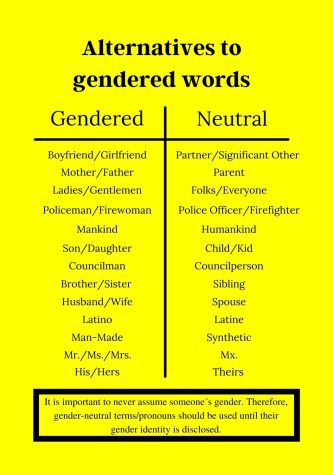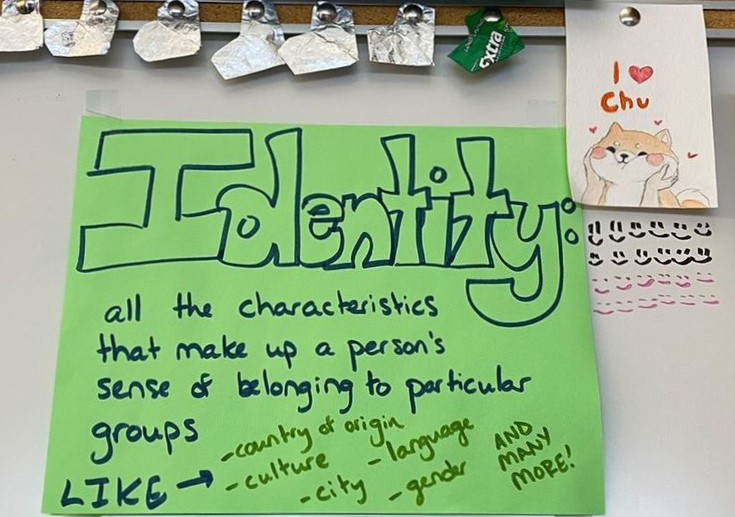Opinion: It’s time to de-gender the English language
Ventura High School English teacher Elizabeth Mainz said, “There’s all kinds of words and phrases that we gender as a society that we don’t always cognitively think of.” Photo by: Alejandro Hernandez
February 24, 2022
Gender-neutral terms must come first
Gender. According to the Merriam-Webster definition, gender is, “the behavioral, cultural, or psychological traits typically associated with one sex.” It has a significant influence on society at large with norms demanded by gender roles. Gender roles influence people to behave in the manner expected by their gender.
In American culture and other western cultures, people were and unfortunately still are, expected to conform to the gender roles according to their gender. But what determines gender? Biological sex is often thought to be the sole determiner of a person’s gender. This results in a binary system (with there being only two possibilities). In reality, gender is on a spectrum, and many people do not align with either male or female.
Sophomore Maeve Searcy said, “Our society is so dependent on gendering things (clothes, hair, appearance, makeup, literally everything) that it’s automatic. Most people don’t even think twice when they gender something or someone because they’re not taught otherwise. From people saying girls belong in the kitchen to saying guys can’t show emotions. There are huge stereotypes that are alive and well in our society.”
Gender also greatly affects language in the sense of how people refer to one another. This is important because language is one of the major machines humans use for perceiving the world. This results in gendered language, which will be defined as, “language that has a bias towards a certain gender.” For example, the word “mankind” would be considered gendered language since it is biased towards the male gender.
Gendered terms often leave people who don’t identify as male or female behind. For example, someone may refer to their love interest as a “boyfriend” or “girlfriend.” However, this negates people who don’t identify with either term, due to gender not being simply two binaries. Conversely, “partner” is a far more vague term that could be applied to a relationship with a person of any gender.
Searcy said, “People should 100 percent use gender-neutral terms in their everyday lives and language. There’s no reason not to. It makes everything easier and everyone more comfortable whether you’re addressing a cis-gendered person or not.”

Not only does gendered language harm people who don’t conform to traditional perceptions of gender, but it also harms closeted LGBTQ+ individuals. For example, an MLM (male who loves males) male may be interested in another male but cannot express that fact to others without revealing their sexuality. They would be forced to use the term “boyfriend.” If “partner” or another gender-neutral term was commonplace then such issues would be far less prevalent.
Ventura High School English teacher Elizabeth Mainz said, “I think it [gendered language] has significance in that we don’t always acknowledge that’s how we see the world [through a gendered lens]. For example, if I’m using pronouns unless I stop to think about it, I am not aware of my perspective.”
Gendered language at its very core reinforces the status quo (that being gender norms or expectations). These norms are themselves a threat to the new understanding of gender identity. Language can be seen as a vehicle that these norms use to intrude on people’s worldview, making them view the world through the lens of male and female. Gender-neutral language seeks to minimize the damaging effects of a gendered world.
Freshman Ash Funnell said, “It [gendered language] has some aspects about it that I feel are rather antiquated. For a lot of people, it [gendered language] works just fine, but for other people, it brings up unique challenges that a lot of people maybe don’t consider or care about.”
Gendered language is also no friend to feminism. It often represents how sexist society can be. For example, the U.S. Declaration of Independence states, “We hold these truths to be self-evident, that all men are created equal.” This overlooks women and is oblivious to non-binary people and many other groups. It prevents true inclusivity from taking place.
Pronouns are also a topic of contention in the gendered language debate. Pronouns are critical to someone’s identity so the correct pronouns must be used. More can be read about pronouns here. Searcy said, “I don’t think there is any use for gendered language. People always make the argument that they/them pronouns don’t work grammatically but that’s so untrue.”
Freshman Kamila Montes de Oca (they/she) said, “I think that gendered language can sometimes be harmful to people who don’t identify as any gender like a-gender people or non-binary people, but if someone’s comfortable with someone referring to them with gendered language it’s fine.”

Many arguments against gender inclusivity come from a lack of willingness to change. Some just may not want to change the way they talk, but in refusing to do so, they only set themselves up to become outmoded in the future, as gender-neutral language becomes more widely recognized.
Freshman Jubilee Cherry believes in a more moderate approach to gender neutrality. Cherry said, “I think in some cases gendered language is okay, like calling someone your boyfriend or girlfriend isn’t anything bad, but I think words like mankind are a tad outdated and discriminatory as humankind would be much better because humans are not just men.”
To give gender-neutral language legitimacy, organizational and governmental bodies must adopt it. In 2019, Berkeley, Calif. replaced many of its gendered words in its city code with gender-neutral words. More cities should follow in Berkeley’s footsteps, and so should Ventura. The net result is a normalization of gender-neutral language in place of gendered language.
Cherry said, “I think people should change their speech by normalizing asking people for their pronouns, and using they/them for people whose pronouns they don’t know.”
In conclusion, no one benefits from gendered language. Instead, it harms multiple different communities in numerous different ways. While the English language cannot be completely rid of gender, gender’s influence on it can be reduced. Prioritizing gender-neutral words over gendered words is something that everyone can do in pursuit of a more inclusive society.







![Lindsay Guzik, new assistant principal said, "I am settling in [at VHS] pretty well. I know a lot of the students, so that makes it a little bit easier coming from Cabrillo, and it's been nice to see them all grown up." Photo by: Abraham Kassa](https://thecougarpress.org/wp-content/uploads/2025/09/IMG_9728-300x200.jpg)
